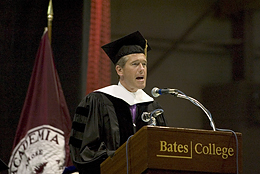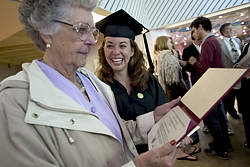Commencement 2005
Bates graduates 517; NBC’s Brian Williams among honorands

“I would not exist if not for Bates College,” NBC Nightly News anchor Brian Williams — the son of two Bates alumni — told the Commencement gathering. Below: Graduate Sarah Neukom of Colorado Springs, Colo., shows off her sheepskin to grandmother Jean Anderson of Portland, Ore.
Speaking at the 139th Commencement ceremony at Bates College, NBC Nightly News anchor Brian Williams observed that this graduating class will be known as the Class of 9/11, which occurred just days after its members started college.
“As much as we would like to hold you all and cradle you in our collective arms and guarantee your safe passage into that American ideal of job and family and prosperity and happiness, that no longer, sadly, comes with the diploma you will receive today,” said Williams. “But I’m not altogether sure it ever did.”
Williams was one of five honorary degree recipients offering advice, ranging from the personal to the political, to 517 graduating seniors today during the ceremony, held inside Merrill Gymnasium due to inclement weather.
About 2,500 family, faculty and friends attended the event. The Bates class of 2005 includes 62 students from Maine.
The other honorands were composer T.J. Anderson, theoretical biologist Lynn Margulis, entrepreneur and engineer Paul Soros and his wife, Daisy M. Soros.
Williams observed that Bates played an important part in his life: His father, Gordon Williams, Class of 1938, met his mother, Dorothy Pampel Williams, Class of 1940, at the college. “I can say without hyperbole that I wouldn’t exist if it wasn’t for Bates College.” Williams’ late brother, David, also graduated from Bates, with the Class of 1965.
Referring to his father’s experience, Williams observed that the “class of 1938 saw their world transformed in a way they could not have known, and many of them strapped on rifles and headed to Europe and the Pacific.  Your equipment will be your minds, your smarts, your talents, your love of country. You are the products of greatness. Things will be asked of you, and lives may depend on you. And you are ready.”
Your equipment will be your minds, your smarts, your talents, your love of country. You are the products of greatness. Things will be asked of you, and lives may depend on you. And you are ready.”
T.J. Anderson said that regardless of one’s discipline, it is important to remember that the arts are a universal language and part of a fulfilling life. He recalled a Soviet goodwill ship that docked at Boston years ago. To his surprise, Anderson said, a band was playing “Mack the Knife.” He took out a piece of paper and wrote a variation of the tune, gave it to a trumpet player, and both began to sing from the manuscript.
“After we finished, we smiled at each other. He took a medal off his jacket and gave it to me. I have often thought about the way people of different cultures communicate not with words, but with the language of music.”
Margulis, a Distinguished University Professor at the University of Massachusetts-Amherst, said that science is “not really for scientists. Science is not reading from a book; it is certainly never reading from a textbook. Science is the search for truth whether we like that truth or not.”
“Science demands criticism of authority, and argument from evidence against authority,” she said. “That’s really hard for most of us, especially if you’ve gotten A’s in all your courses.”
Philanthropist Daisy Soros asked graduates to make a “philanthropic autobiography — an accounting of what you have received from others and what in the course of your life you have done to repay them.”
“Your philanthropic autobiography should be a long book,” she said.
Her husband, philanthropist and engineer Paul Soros, related his own understanding of truth and government from his experiences growing up in Hungary in the 1930s and ’40s. He recalled living under fascist rulers, then briefly as a prisoner of war of the Soviets, and then under communism before escaping to the West.
“A free society doesn’t just happen,” Soros said. “We tend to take our rights for granted, but they are under siege from governments eager for more power to deal with the problems of the moment, and people of good will and faith who want to impose on society their beliefs and convictions.”
He said, “The rule of law and the freedom from arbitrary government actions is one of the great gifts you and I have been given. If there is anything I want you to remember from these brief moments, it is that a major measure of your life as a citizen is the degree to which you protect the openness of American society. The price of liberty, indeed, is eternal vigilance.”
Leading the ceremony was President Elaine Tuttle Hansen, who noted that this year marks the college’s 150th anniversary.
“In commemorating our sesquicentennial on this and other special occasions, we find ourselves looking back at the founders of the college with reverence and awe,” Hansen said. “We stand here today because they were visionaries. With few resources and no powerful backers, mostly members of a religious splinter group divided from the mainstream by strident abolitionist views, they took enormous risks for the causes they believed in. We are the future their courage called forth.”